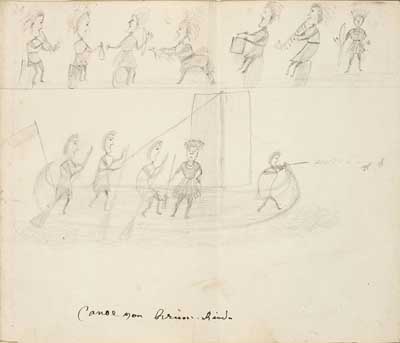While warriors had complete freedom to make their own decisions about if and how they would engage in a battle, tribal communities had considerable influence in the warrior’s choices.
The War of 1812, engulfing the entire eastern United States, left the future of a tribe in no way as a certainty.

Weltmuseum Wien
The discussions among a community faced with a decision to go to war were not held lightly. Councils would be held among village leaders, men and women alike, with input, opinions and advice from all voices collected. The repercussions of war could spell the end of a tribe, and a community’s decision to encourage warriors to fight was taken seriously. When war was decided upon, tribes had to prepare.
Extended kinship networks would be called upon to provide an alternate location for a village to go to if enemies advanced. This alternate location had to have water, food and safety from further attacks. Whether a village relied on crops for subsistence or access to hunting and fishing territories, war could mean starvation, with hunting grounds occupied by hostile forces and food stores destroyed by occupying armies. To make a decision about where to seek refuge, Tribal leaders had an immensely complicated task of navigating tribal alliances, politics and protocols. Past wars among tribes had to be negotiated, as well as economic status of villages and prominent leaders.
Religious upheaval was sweeping through the Ohio valley pre-1812, as witch hunts raged through Delaware villages. The fall out of the Prophet’s false self-proclamation as the chosen leader, ordained by the Great Spirit, also had to be accounted for. The rise of Tecumseh to prominence was not accepted by all Shawnee. Years of war prior to 1812 had made many leaders weary and tired of further fighting. Some preferred entering into negotiations with the Americans, which required serious attention to possible backlash from fellow tribes.
Wives, sisters, mothers and grandmothers had the possibility of losing their men to combat, leaving a huge hole in villages and families. Life at the turn of the 19th century was precious, as diseases and conflict took a heavy toll on tribal communities. Although for thousands of years life had carried on for many communities, The War of 1812, engulfing the entire eastern United States, left the future of a tribe in no way as a certainty.
Last updated: November 10, 2017
